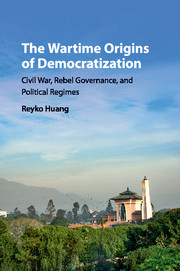Book contents
- Frontmatter
- Contents
- List of Figures
- List of Tables
- List of Acronyms
- Acknowledgments
- 1 Introduction
- 2 War-Making, Mobilization, and Democratization
- 3 Rebel Governance: How Rebels Interact with Ordinary People During Conflict
- 4 Testing the Effects of Rebel Governance on Postwar Democratization
- 5 Tracing the Steps from War Time to Peace Time: Case Studies Overview
- 6 War and Change in Nepal
- 7 War and Postwar Regime Formation in Uganda, Tajikistan, and Mozambique
- 8 Conclusion
- Appendix Rebel Governance Dataset: Notes, List of Cases, and Summary Statistics
- Bibliography
- Index
Appendix - Rebel Governance Dataset: Notes, List of Cases, and Summary Statistics
Published online by Cambridge University Press: 05 September 2016
- Frontmatter
- Contents
- List of Figures
- List of Tables
- List of Acronyms
- Acknowledgments
- 1 Introduction
- 2 War-Making, Mobilization, and Democratization
- 3 Rebel Governance: How Rebels Interact with Ordinary People During Conflict
- 4 Testing the Effects of Rebel Governance on Postwar Democratization
- 5 Tracing the Steps from War Time to Peace Time: Case Studies Overview
- 6 War and Change in Nepal
- 7 War and Postwar Regime Formation in Uganda, Tajikistan, and Mozambique
- 8 Conclusion
- Appendix Rebel Governance Dataset: Notes, List of Cases, and Summary Statistics
- Bibliography
- Index
Summary
Major Civil Wars, 1950–2006
The Rebel Governance Dataset (RGD) contains data on rebel income sources and rebel institution building for the main rebel group in major civil wars that ended between between 1950 and 2006. It is based on an adapted and updated list of wars from Doyle and Sambanis (2006, hereafter DS2006). Chapter 3 provides a discussion on why it is apt that I limit my cases to major civil wars as defined by DS2006.
DS2006 contains 151 civil wars that began between 1944 and 1999. I used the following scheme to identify cases for inclusion in the RGD. First, from this list, I omitted the eleven wars that ended before 1950, for two reasons: (1) some of these wars began before the end of the Second World War, and hence may have been qualitatively different from the post–World War II conflicts, and (2) information on 1940s civil wars was relatively more difficult to locate, so instead of introducing systematic bias from missing data for those wars, I chose to limit the scope of the dataset to wars ending in or after 1950.
Second, from the remaining list, I dropped ten civil wars that were ongoing as of 2006. Since the dependent variable is post–civil war regimes, the analysis requires of cases at least a few postconflict years; 2006 was deemed an appropriate cut-off point.
Third, in the process of case-by-case research and coding, I chose to exclude two more cases: Cyprus (1974) and Kenya (1991–1993). The Cyprus case is conventionally considered an interstate war between the Greek Cypriot government and Turkey after the latter's invasion on July 20, 1974 (see, for instance, the UCDP/PRIO dataset, version 4; Gleditsch et al. 2002). In Kenya's Rift Valley violence of the early 1990s, the government was clearly complicit in the ethnic and communal violence. However, the government was not one of the major belligerents of the war; rather, it was essentially a civil war by proxy. Thus, the rebels were not fighting directly against the government in this case. Given questions as to whether or not each of these cases qualifies as a civil war, I chose to omit them.
- Type
- Chapter
- Information
- The Wartime Origins of DemocratizationCivil War, Rebel Governance, and Political Regimes, pp. 188 - 198Publisher: Cambridge University PressPrint publication year: 2016

